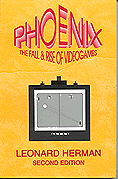
|
|
|
| Leonard Herman's 1997 updated edition of his 1994 original work is a fascinating study of the coin-op and home video phenomena. The author has taken an otherwise largely undocumented bit of cultural and economic history and pulled it all together for fans and students of the genre. It is, to say the least, an amazing piece of work. He begins with a capsulated chapter on computer history, suggesting that the first "adding machines" were born as humanity discovered the capability to count on his and her fingers. The remarkable growth and misfires throughout the decades have resulted in today's 300+ MHZ microchip wonders, but Herman is merely setting the stage. He dives headlong into the innocent creation of a 1950s oscilloscope-based game of tennis, one of the earliest examples (if not the first) of a game played on an electronic screen. Up until the founding of Atari in 1972, the tale is filled with participants who nibbled around the edges of video games as a viable source of entertainment and profit. The introduction of Atari's Pong (1972) and its subsequent success created a new facet of the coin-op industry: the arcade videogame. While not the first coin-op video, it is the one responsible for all that would follow. Magnavox would perform a similar historical feat that same year in the consumer marketplace with their Odyssey home video system. It's during this pivotal time that we begin to understand the co-existence and corporate behavior of early coin-op and home-based video manufacturers. Herman's deft unfolding of the remarkable events is what makes Phoenix such an interesting work. The author provides historical profiles and backgrounds of several companies as they entered the exploding video playing field. For example, did you know that Sega was founded by an American?... or that Nintendo has been in business since 1889?... or that Coleco was originally a leather provider to shoe manufacturers? It's this kind of thorough research that makes this book so indispensable. By 1984 the coin-op video craze was all but over and the author then concentrates primarily on the home-based systems. While Phoenix contains its share of technical and game play info, it's the larger story of the birth to present day status of videogames that we find to be its overall strength. Herman has done an outstanding job. Highly recommended. |